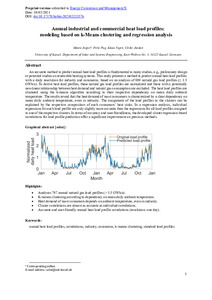| dc.date.accessioned | 2021-04-13T13:06:43Z | |
| dc.date.available | 2021-04-13T13:06:43Z | |
| dc.date.issued | 2021-03-19 | |
| dc.identifier | doi:10.17170/kobra-202103233576 | |
| dc.identifier.uri | http://hdl.handle.net/123456789/12700 | |
| dc.description | This is the preprint version of the article "Annual industrial and commercial heat load profiles: modeling based on k-Means clustering and regression analysis".
Date: 19/03/2021. | eng |
| dc.description.sponsorship | This work was supported by the German Federal Ministry for Economic Affairs and Energy within the framework of the 7th Energy Research Program [project: “AnanaS”, grant number 03ETW014A]. The authors would like to express their sincere thanks to the ministry for the financial support and to the involved utilities for providing natural gas load profiles. | eng |
| dc.language.iso | eng | eng |
| dc.rights | Namensnennung - Weitergabe unter gleichen Bedingungen 4.0 International | * |
| dc.rights.uri | http://creativecommons.org/licenses/by-sa/4.0/ | * |
| dc.subject | annual heat load profiles | eng |
| dc.subject | correlations | eng |
| dc.subject | industry | eng |
| dc.subject | commerce | eng |
| dc.subject | k-means clustering | eng |
| dc.subject | standard load profiles | eng |
| dc.subject.ddc | 620 | |
| dc.title | Annual industrial and commercial heat load profiles: modeling based on k-Means clustering and regression analysis | eng |
| dc.type | Preprint | |
| dcterms.abstract | An accurate method to predict annual heat load profiles is fundamental to many studies, e.g., preliminary design or potential studies on renewable heating systems. This study presents a method to predict annual heat load profiles with a daily resolution for industry and commerce, based on an analysis of 800 natural gas load profiles (≥ 1.5 GWh/a). To derive heat load profiles, these natural gas load profiles are normalized and those with a potentially non-linear relationship between heat demand and natural gas consumption are excluded. The heat load profiles are clustered using the k-means algorithm according to their respective dependency on mean daily ambient temperature. The results reveal that the heat demand of most consumers is characterized by a clear dependency on mean daily ambient temperature, even in industry. The assignment of the load profiles to the clusters can be explained by the respective composition of each consumers’ heat sinks. In a regression analysis, individual regressions for each load profile are only slightly more accurate than the regressions for all load profiles assigned to one of the respective clusters. In terms of accuracy and user-friendliness, the developed cluster regression-based correlations for load profile prediction offer a significant improvement on previous methods. | eng |
| dcterms.accessRights | open access | |
| dcterms.creator | Jesper, Mateo | |
| dcterms.creator | Pag, Felix | |
| dcterms.creator | Vajen, Klaus | |
| dcterms.creator | Jordan, Ulrike | |
| dcterms.extent | 42 Seiten | |
| dc.contributor.corporatename | Kassel, Universität Kassel, Fachbereich Maschinenbau | ger |
| dc.relation.issupplementedby | doi:10.17632/nwxv38dxsr.1 | |
| dc.relation.projectid | 03ETW014A | |
| dc.subject.swd | Thermische Belastung | ger |
| dc.subject.swd | Lastprofil | ger |
| dc.subject.swd | Korrelation | ger |
| dc.subject.swd | Industrie | ger |
| dc.subject.swd | Handel | ger |
| dc.subject.swd | k-Means-Algorithmus | ger |
| dc.type.version | submittedVersion | |
| kup.iskup | false | |


